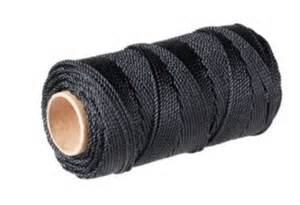Twisted Tarred Twine
Tarred twine is normally twisted nylon twine that is coated with “tar” – sometimes known as asphalt net coat. This coating solves several problems inherent with uncoated twines. The tar is a liquid the loose twine is dipped into, dried, then wound onto spools. This method of dipping, drying, then winding gives an even coating throughout the twine.
- Tar has been used for centuries to preserve nets, ropes, and twines
- Tarred twine has excellent knot holding capabilities- uncoated twine with knots will slip under pressure
- Tarred twine will not unravel or untwist when cut
- Tarred twine is more abrasion resistant when rubbing or chaffing against something- will last longer than uncoated twine
- Tarred twine is more resistant to damage from sunlight than uncoated twine
- Tar will rub off onto other surfaces and can be messy if not dried properly
- Tarred twine is more expensive than uncoated twine, but usually not quite as expensive as bonded twine
- Tarred twine is heavier than uncoated twine, and the yield (feet or meters long per pound or kilo) is less than uncoated twine
- Tarred twine is stiffer (harder) than uncoated twine, but usually softer than bonded twine
- Tarred twine is black color and cannot be dyed any other color
- Ideal for use in hanging (making) fish nets, crafts, or any application where knot integrity is important
Twisted Tarred Twine | |||||||
| Diameter | Yield | Tensile Strength | |||||
| American | Approx. | Approx. | Feet | Meters Per | |||
| Size | Inches | Denier | Millimeters | Per Pound | Kilo | Pounds | Kilos |
| 7 (#415) | 0.035 | 210d/18 | 0.89 | 2500 | 1562.1 | 62 | 28.1 |
| 9 | 0.042 | 210d/24 | 1.07 | 2000 | 1249.7 | 80 | 36.3 |
| 12 | 0.046 | 210d/30 | 1.17 | 1500 | 937.3 | 100 | 45.4 |
| 15 | 0.051 | 210d/36 | 1.30 | 1263 | 789.2 | 126 | 57.1 |
| 18 | 0.058 | 210d/48 | 1.47 | 982 | 613.6 | 165 | 74.8 |
| 21 | 0.065 | 210d/60 | 1.65 | 771 | 481.8 | 200 | 90.7 |
| 24 | 0.073 | 210d/72 | 1.85 | 615 | 384.3 | 250 | 113.4 |
| 30 | 0.078 | 210d/84 | 1.98 | 528 | 329.9 | 275 | 124.7 |
| 36 | 0.085 | 210d/96 | 2.16 | 439 | 274.3 | 325 | 147.4 |
| 42 | 0.093 | 210d/108 | 2.36 | 365 | 228.1 | 370 | 167.8 |
| 48 | 0.103 | 210d/132 | 2.62 | 320 | 199.9 | 420 | 190.5 |
| 60 | 0.116 | 210d/168 | 2.95 | 238 | 148.7 | 560 | 254.0 |
| 72 | 0.125 | 210d/192 | 3.18 | 237 | 148.1 | 635 | 288.0 |
| 96 | 0.158 | 210d/276 | 4.01 | 150 | 93.7 | 911 | 413.2 |
| 120 | 0.17 | 210d/336 | 4.32 | 130 | 81.2 | 1050 | 476.2 |
